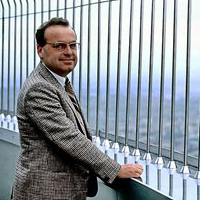Herbert Walther Award
Get Involved
- Awards & Honors
- Community Engagement
- Early Career Professional...
- Education Outreach
- Public Affairs
- Local Section
- Students
-
Technical Groups
- Bio-Medical Optics
- Fabrication, Design and Instrumentation
- Image Acquisition, Processing. Display and Perception
- Optical Interaction Science
- Photonics and Opto-Electronics
- Quantum
- Sensing
- Technical Group Leadership Volunteers
- Technical Group Webinars
- Technical Group Search
- Technical Group Prizes
- Simulight Optics Challenge
- Volunteer
- Awards & Honors
- Community Engagement
- Early Career Professionals
- Education Outreach
- Public Affairs
- Local Section
- Students
-
Technical Groups
- Bio-Medical Optics
- Fabrication, Design and Instrumentation
- Image Acquisition, Processing. Display and Perception
- Optical Interaction Science
- Photonics and Opto-Electronics
- Quantum
- Sensing
- Technical Group Leadership Volunteers
- Technical Group Webinars
- Technical Group Search
- Technical Group Prizes
- Simulight Optics Challenge
- Volunteer
Herbert Walther Award
The award was established in 2008, with Deutsche Physikalische Gesellschaft (DPG), to honor Herbert Walther for his ground-breaking innovations in quantum optics and atomic physics, and for his wide-ranging contributions to the international scientific community.
Society Connection
Herbert Walther was a Fellow and volunteer, serving on several meeting committees and the Publications Council. He received the Frederic Ives Medal / Jarus W. Quinn Prize and Charles Hard Townes Medal.
Key Funders
Toptica Photonics AG, Berthold Leibinger Stiftung GmbH, Messe München International - LASER World of PHOTONICS, Tony and Jeannie Siegman, Joseph and Shirley Eberly, Gerd Leuchs, Marlan Scully, Wolfgang Ketterle, Peter Knight, Y. Ron Shen
About Herbert Walther
 Walther was born on January 19, 1935 in Ludwigshafen/Rhein. He studied Physics at Ruprecht Karl’s University Heidelberg where he received his diploma in 1960 and his PhD two years later. He worked as a research scientist at the University of Hanover, at Laboratoire Aimé Cotton (CNRS) in Orsay, France and at the Joint Laboratory of Astrophysics in Boulder, Colorado, USA.
Walther was born on January 19, 1935 in Ludwigshafen/Rhein. He studied Physics at Ruprecht Karl’s University Heidelberg where he received his diploma in 1960 and his PhD two years later. He worked as a research scientist at the University of Hanover, at Laboratoire Aimé Cotton (CNRS) in Orsay, France and at the Joint Laboratory of Astrophysics in Boulder, Colorado, USA.
In 1971 he was appointed as professor at the Rheinische-Friedrich-Wilhelms-Universität Bonn, but then moved to the University of Cologne in the same year. In 1975 he was appointed Chair of Physics at Ludwig Maximilian’s University Munich until his retirement in March 2003. He is known for his work in plasma and laser physics.
Walther was a Fellow, volunteer and the recipient of the 1990 Charles Hard Townes Medal and the 2003 Frederic Ives Medal / Jarus W. Quinn Prize.
He was the founding member of the Max Planck project group Laserforschung at the Max Planck Institute of Plasma Physics (IPP) in 1976. He was the founding member of the Max Planck Institute of Quantum Optics in 1981 and the director at the Max Planck Institute of Quantum Optics from 1981 till 2003. After retirement, he continued to serve as the leader of the Laser Physics Emeritus Group most actively involved in research. He died in Munich on 22 July 2006.
